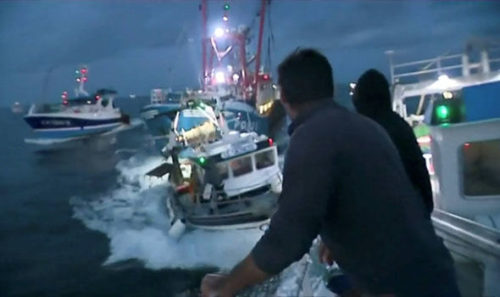
French Agriculture Minister, Stephane Travert said on Tuesday the Navy is ready to intervene if clashes between French and British fishermen over access to scallop-rich seabeds erupt again on the open seas.
Travert said he had spoken to his British counterpart and that talks between the two sides were due on Wednesday after French vessels chased their rivals out of the Baie de Seine last week.
British fishermen accused the French of ramming their vessels and hurling projectiles. Disgruntled French fishermen, unhappy that their British rivals can dredge for scallops year round while they are barred from doing so during summer months, said they came under a violent counter-attack.
“We can’t keep going on like this, we can’t keep having skirmishes like that,” Travert said in an interview on CNews. “The French Navy is ready to step in if more clashes break out, as well as carrying out checks.”
The row highlights problems between European member states over fishing rights, a subject that is likely to become increasingly sensitive as Britain negotiates its future trade relationship with the European Union.
Scallops – known as Coquille Saint Jacques in France – are one of just a few species whose catch is governed by national rather than European Union regulations.
France bans all scallop dredging between May 15 and Oct. 1, but Britain allows its vessels to operate year-round.
While British ships have no access to French territorial waters up to 12 nautical miles (22 km) off the coast, they can legally operate in the expansive Baie de Seine that stretches from Cherbourg to Dunkirk.
After the row – dubbed the Scallop Wars – flared up five years ago, French and British fishermen brokered yearly agreements that saw the British limit their scallop dredging in the Baie de Seine in exchange for some French scallop permits.
But those agreements have foundered in the past two years, French fishermen say, citing Britain’s exit from the EU as a possible reason.
Agency Report